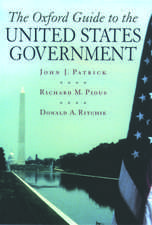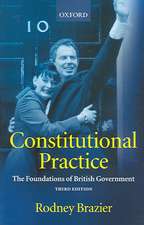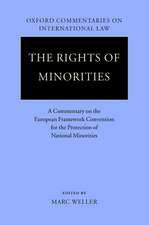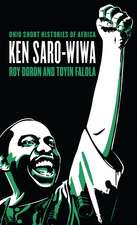Forced Justice: School Desegregation and the Law
Autor David J. Armoren Limba Engleză Hardback – 24 aug 1995
| Toate formatele și edițiile | Preț | Express |
|---|---|---|
| Paperback (1) | 490.07 lei 31-37 zile | |
| Oxford University Press – 26 sep 1996 | 490.07 lei 31-37 zile | |
| Hardback (1) | 1095.53 lei 31-37 zile | |
| Oxford University Press – 24 aug 1995 | 1095.53 lei 31-37 zile |
Preț: 1095.53 lei
Preț vechi: 1579.38 lei
-31% Nou
Puncte Express: 1643
Preț estimativ în valută:
209.66€ • 218.08$ • 173.08£
209.66€ • 218.08$ • 173.08£
Carte tipărită la comandă
Livrare economică 04-10 aprilie
Preluare comenzi: 021 569.72.76
Specificații
ISBN-13: 9780195090123
ISBN-10: 0195090128
Pagini: 288
Ilustrații: line figures, tables
Dimensiuni: 162 x 243 x 24 mm
Greutate: 0.54 kg
Editura: Oxford University Press
Colecția OUP USA
Locul publicării:New York, United States
ISBN-10: 0195090128
Pagini: 288
Ilustrații: line figures, tables
Dimensiuni: 162 x 243 x 24 mm
Greutate: 0.54 kg
Editura: Oxford University Press
Colecția OUP USA
Locul publicării:New York, United States
Notă biografică
USA
Recenzii
"Likely to set off a fresh debate among lawyers, educators and social scientists...."--The New York Times Book Review
"The result of this marriage of social science research and participation in the policy process is the most impressive compilation of empirical evidence showing a depth of contextual knowledge published to date."--American Political Science Review
"A compelling argument for..."equity choice"...and a significant contribution of the discussion of desegregation in America."--The Indianapolis Star
"Armor's well-balanced analysis leads him to both heartening and sobering conclusions about the entire enterprise of school desegregation."--Journal of American History
"Forced Justice is the most thorough and incisive examination of school desegregation I am aware of. Armor's idea of equity choice is one of those perfectly reasonable solutions to a complex problem that seems embarrassingly obvious once you hear it. This book will change the discussion of school desegregation in America."--Shelby Steele, author, The Content of Our Character: A New Vision of Race in America
"As the era of compulsory busing for school desegregation comes to a close, David Armor examines the evidence dispassionately. He finds that the benefits of this policy were usually minuscule, and the cost often enormous. Forced Justice is a persuasive, detailed analysis of one of the most divisive policy initiatives in modern American history. It proves beyond doubt that good intentions are often not enough."--Glenn Loury, Boston University
"David J. Armor's Forced Justice is a thoughtful, balanced analysis of one of the most contentious issues in recent American history. In addition to providing a judicious assessment of the past, Armor describes the policies that are likeliest to support successful school desegregation in the future."--Diane S. Ravitch, New York University
"Finally a comprehensive and balanced study of busing and school desegregation. If you want a polemic on this controversial problem, go somewhere else. David Armor's special contribution is that he has conducted a fact-anchored inquiry that explores whether mandatory busing to bring about mathematical integration has served the country well. Equally important, he confronts the critical issue of how equality in the United States derives its meaning as well as its limits from the larger system of democratic values to which it belongs."--John H. Bunzel, Stanford University
"David Armor's book is the definitive work on the subject of school desegregation's effects. He carefully evaluates and synthesizes a massive amount of psychological and sociological research including his own original studies. For the first time, we are given definitive conclusions and sound policy implications for one of the most enduring, controversial, and important educational issues of the last half century--the effects of desegregation on African-American students' learning. The book should be indispensable to educators, scholars, and policy makers concerned about school desegregation."--Herbert J. Walberg, University of Illinois at Chicago
"This is the most important book on school desegregation since the 1965 Coleman Report. Indeed, in some respects, it is a more impressive accomplishment than the Coleman Report since Forced Justice covers a much broader range of desegregation outcomes and issues and, unlike the Coleman Report, is solo-authored."--Christine Rossell, Boston University
"Armor's book is timely....Those who are trying to find a solution to this conundrum of race and education will need to ponder long and hard both the evidence and the prescriptions contained here."--The Review of Politics
"The result of this marriage of social science research and participation in the policy process is the most impressive compilation of empirical evidence showing a depth of contextual knowledge published to date."--American Political Science Review
"A compelling argument for..."equity choice"...and a significant contribution of the discussion of desegregation in America."--The Indianapolis Star
"Armor's well-balanced analysis leads him to both heartening and sobering conclusions about the entire enterprise of school desegregation."--Journal of American History
"Forced Justice is the most thorough and incisive examination of school desegregation I am aware of. Armor's idea of equity choice is one of those perfectly reasonable solutions to a complex problem that seems embarrassingly obvious once you hear it. This book will change the discussion of school desegregation in America."--Shelby Steele, author, The Content of Our Character: A New Vision of Race in America
"As the era of compulsory busing for school desegregation comes to a close, David Armor examines the evidence dispassionately. He finds that the benefits of this policy were usually minuscule, and the cost often enormous. Forced Justice is a persuasive, detailed analysis of one of the most divisive policy initiatives in modern American history. It proves beyond doubt that good intentions are often not enough."--Glenn Loury, Boston University
"David J. Armor's Forced Justice is a thoughtful, balanced analysis of one of the most contentious issues in recent American history. In addition to providing a judicious assessment of the past, Armor describes the policies that are likeliest to support successful school desegregation in the future."--Diane S. Ravitch, New York University
"Finally a comprehensive and balanced study of busing and school desegregation. If you want a polemic on this controversial problem, go somewhere else. David Armor's special contribution is that he has conducted a fact-anchored inquiry that explores whether mandatory busing to bring about mathematical integration has served the country well. Equally important, he confronts the critical issue of how equality in the United States derives its meaning as well as its limits from the larger system of democratic values to which it belongs."--John H. Bunzel, Stanford University
"David Armor's book is the definitive work on the subject of school desegregation's effects. He carefully evaluates and synthesizes a massive amount of psychological and sociological research including his own original studies. For the first time, we are given definitive conclusions and sound policy implications for one of the most enduring, controversial, and important educational issues of the last half century--the effects of desegregation on African-American students' learning. The book should be indispensable to educators, scholars, and policy makers concerned about school desegregation."--Herbert J. Walberg, University of Illinois at Chicago
"This is the most important book on school desegregation since the 1965 Coleman Report. Indeed, in some respects, it is a more impressive accomplishment than the Coleman Report since Forced Justice covers a much broader range of desegregation outcomes and issues and, unlike the Coleman Report, is solo-authored."--Christine Rossell, Boston University
"Armor's book is timely....Those who are trying to find a solution to this conundrum of race and education will need to ponder long and hard both the evidence and the prescriptions contained here."--The Review of Politics
















